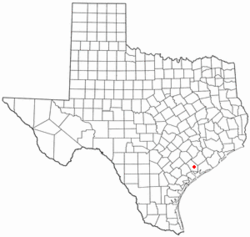La Ward, Texas
| La Ward, Texas | |
|---|---|
| City | |
 Location of La Ward, Texas |
|
 |
|
| Coordinates: 28°50′42″N 96°27′56″W / 28.84500°N 96.46556°WCoordinates: 28°50′42″N 96°27′56″W / 28.84500°N 96.46556°W | |
| Country | |
| State |
|
| County |
|
| Area | |
| • Total | 0.8 sq mi (2.1 km2) |
| • Land | 0.8 sq mi (2.1 km2) |
| • Water | 0.0 sq mi (0.0 km2) |
| Elevation | 39 ft (12 m) |
| Population (2000) | |
| • Total | 200 |
| • Density | 245.8/sq mi (94.9/km2) |
| Time zone | Central (CST) (UTC-6) |
| • Summer (DST) | CDT (UTC-5) |
| ZIP code | 77970 |
| Area code(s) | 361 |
| FIPS code | 48-41848 |
| GNIS feature ID | 1360808 |
La Ward is a city in Jackson County, Texas, United States. The population was 200 at the 2000 census. The U.S. Census Bureau estimates the population at 193 as of 1 July 2008.
La Ward is located at 28°50′42″N 96°27′56″W / 28.84500°N 96.46556°W (28.845036, -96.465659), at the junction of State Highway 172 and FM 616 in southern Jackson County, approximately 12 miles south of Ganado and 17 miles southeast of Edna. The nearest large city is Victoria, 46 miles west of La Ward.
The United States Census Bureau lists the total city area at 0.8 square miles (2.1 km2), all of it land.
The community emerged on the coastal prairie in 1904 with the arrival of the St. Louis, Brownsville and Mexico Railway. It was named for Lafayette Ward, a local who became a leader in introducing Hereford, Brahman, and Jersey cattle to Texas. By 1914, La Ward had developed into a cattle and shipping center. The community had its own independent school district and an estimated population of 200 in 1940. That number had risen to around 300 by the early 1960s. Throughout the remainder of the twentieth century, La Ward's population declined to 247 in 1970, to 218 in 1980, and to 162 in 1990. It increased to 200 in 2000, a 23 percent increase over the 1990 figure.
...
Wikipedia
